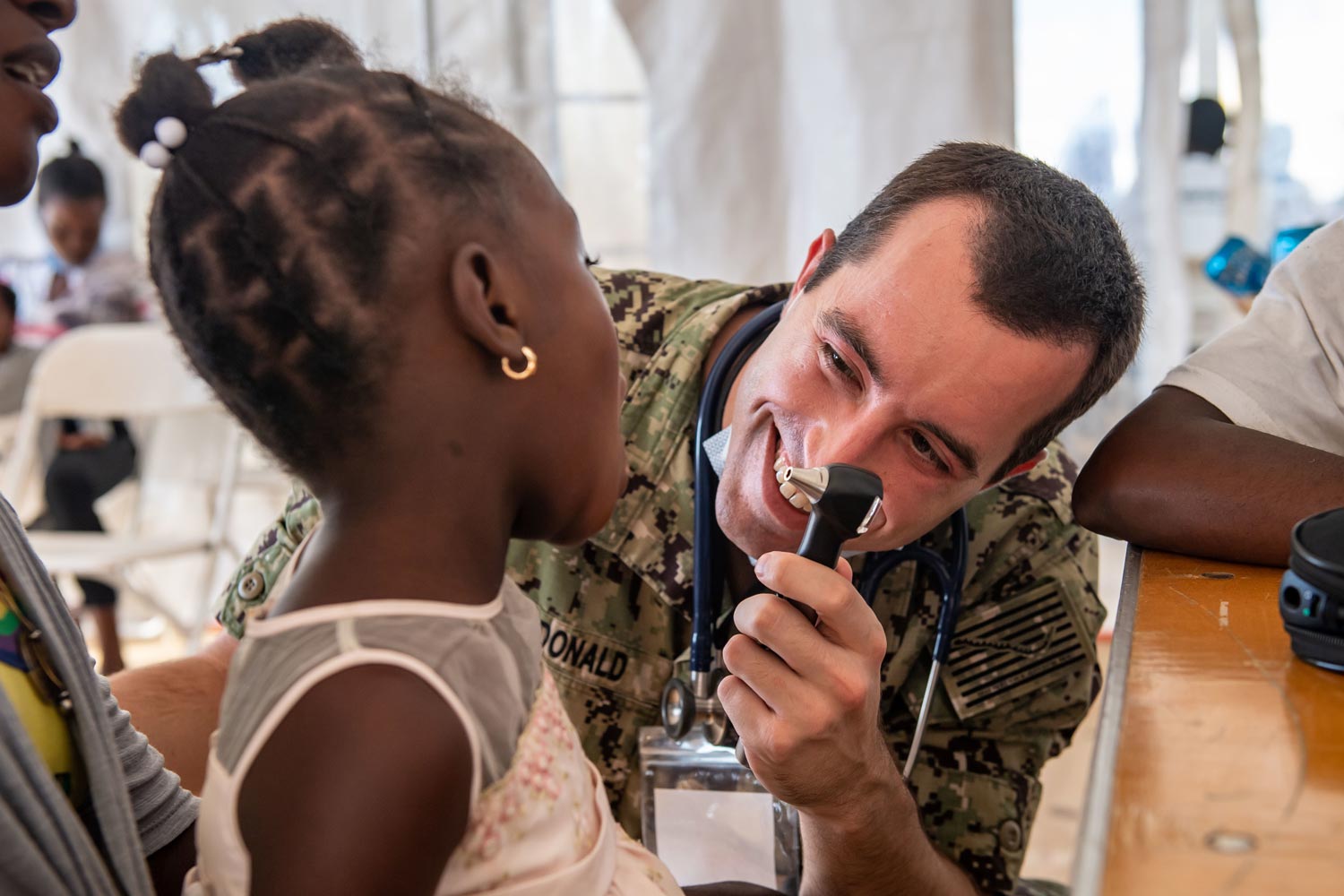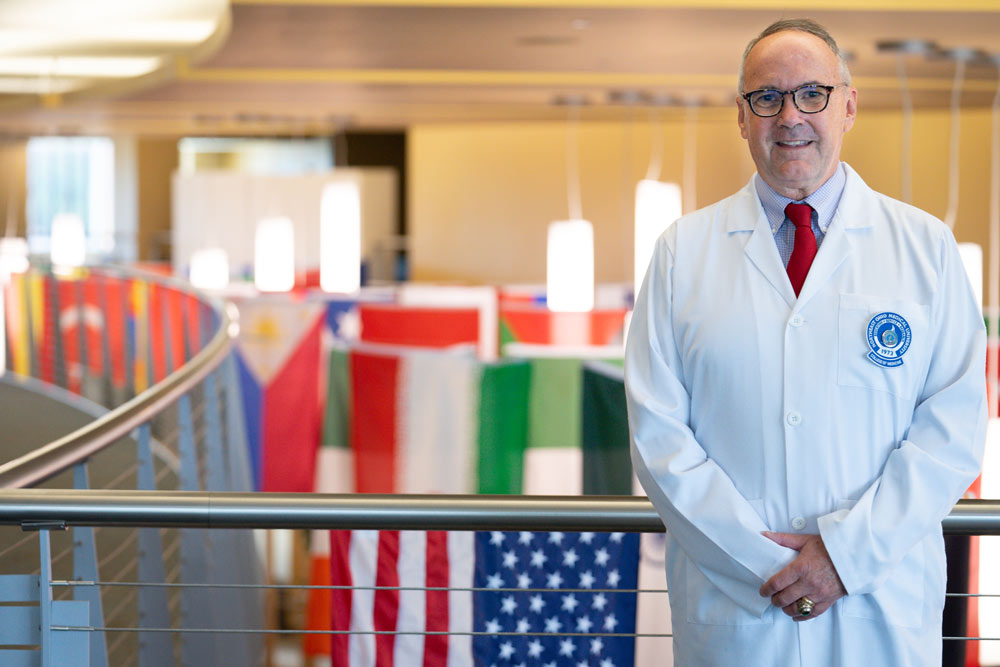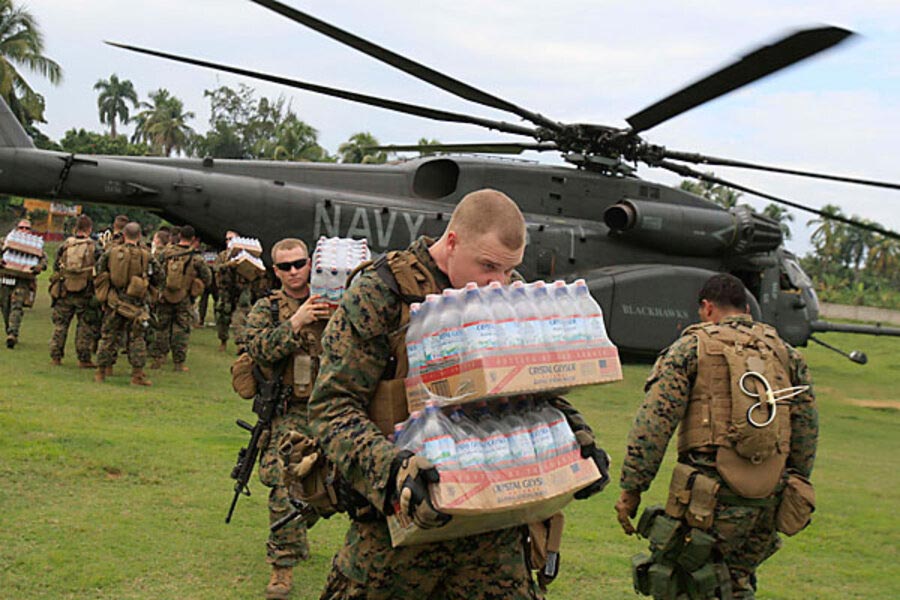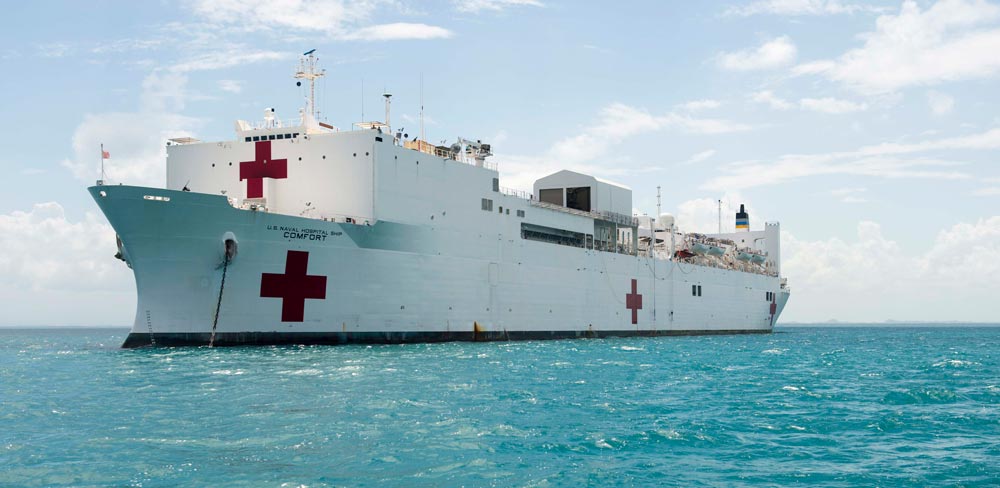Personable. Precise. Prescriptive.
Those are the first words that come to mind when talking global health with C. Forrest Faison III, M.D., FAAP, a retired vice admiral who served as the 38th surgeon general of the U.S. Navy.
Dr. Faison, in his current role as provost and senior vice president for academic affairs at Northeast Ohio Medical University, provided a definitive response when asked about why he stresses the importance of global health to current and future health professionals.

U.S. Navy personnel build relationships with communities before crises occur. Photo provided by C. Forrest Faison, M.D.
He said, “Why do we do global health? We know the world is more connected now than ever before. We live in a global economy. And we can be anywhere in the world today well within the incubation period of a lethal, infectious disease. We are closer together. We are more connected interdependently and globally than we have ever been. And yet, when you look at the world today, we are much more challenged than perhaps any time in the past.”
To illustrate, Dr. Faison noted that most of the goods that come to the U.S. are from Asia, where 70% of the world's national disasters also occur. The severity of those disasters is getting worse because of climate change.
“Because of climate change, resultant crop failures and water shortages, we are seeing mass migrations of people to the coast,” noted Dr. Faison. “What you're seeing is the rise of coastal mega cities, cities that were never intended to be called upon to manage the size of the populations that they're now managing.”
The American way of life and access to goods and services depend heavily on global stability and global peace. Natural disasters or displaced populations can be just as disruptive as global conflict and such cities have become breeding grounds for infectious diseases, which can spread very quickly. There’s also concern over clean, fresh water. Availability of fresh water may be our next global crisis and cause of conflict.

C. Forrest Faison III, M.D., retired vice admiral, 38th surgeon general of the U.S. Navy, and provost and senior vice president for academic affairs at NEOMED.
C. Forrest Faison III, M.D., retired vice admiral, 38th surgeon general of the U.S. Navy, and provost and senior vice president for academic affairs at NEOMED.
Global health offers a solution.
“Global health brings value in that it allows us to build relationships and partnerships with colleagues and compatriots in distant lands,” Dr. Faison said. “With working relationships in which we share information, many benefits accrue.
YOU CANNOT SURGE TRUST
“There's a saying in the military that you cannot surge trust,” said Dr. Faison. “And so, engaging in global health discussions before a crisis not only allows us to respond to critical incidents but it also enables us to build trustful working relationships with our colleagues around the world. When crisis comes, not if but ‘when,’ those relationships are already in place, you know.
“We need to make sure we bring the things we learn back and apply them to communities in the United States that could benefit from them.”
— Forrest Faison III, M.D., FAAP
“Take pandemics and epidemics. We’ve had them since antiquity. The first pandemic was actually described in ancient Greece. They all behave the same way: spreading by the trade routes. Today, it’s the airline routes that enable quicker spread. That’s exactly what we saw with COVID. Now, because of the speed of spread, you need global relationships in place to come together as a community to be able to deal with these pandemics.”
Citizens, communities, countries and climates can all benefit from global health.
Businesses, universities and philanthropic organizations engage in global health activities. But they don’t always exercise the benefits full circle. Many go to distant countries and help with infectious diseases, environmental issues and population health. Nevertheless, they don’t always bring those lessons learned and experiences back to the United States, where many of the same issues exist, especially in urban and underserved populations.
“For example, Cleveland,” said Dr. Faison. “Despite having many of the world’s top health systems and all of those resources available to us, the actual health of Cleveland residents is below the national average on every measure of health, from neonatal mortality and pediatric diseases to chronic disease and longevity.

With 40% of the U.S. Navy deployed at sea every day, they are often among the first to respond in global crises. Photo provided by C. Forrest Faison, M.D..
“And it’s for many of the same reasons, like environmental issues where one in six kids has measurable lead in their blood from paint chips. It's the availability of clean air and clean water. It’s the lack of trust in medical providers, things like that. So, we need to make sure we bring the things we learn back and apply them to communities in the United States that could benefit from them.”
ART AND CULTURE
“Medicine is an art around which we wrap science,” noted Dr. Faison. “We rely on science to help inform our decisions and our understanding of diseases, increasing our ability to develop cures and treatments. But at the heart of it, it is an art of compassion and caring because there is much we don't cure and much we can’t treat. And the art is very culturally based. How you approach patients very much depends on cultural issues, sensitivity to ethnic issues and demographic issues.”
When we engage with colleagues globally, he added, we learn from each other and help advance health around the world.
Dr. Faison has been involved in global health for most of his career, leading response efforts to major disasters such as in the 2010 earthquake in Haiti, estimated to have caused as many as 300,000 deaths, and the nuclear accident at the Fukushima Daiichi Nuclear Power Plant in Japan, which was caused by the Tōhoku earthquake and tsunami in 2011.
He's also led military responses to viruses: Zika, Ebola and COVID-19.
“The U.S. Navy did virtually all the testing for the Ebola virus in Western Africa, and it has labs all over the world. We [the Navy], in partnership with the host nation, put a lab in Western Africa to start the groundwork for an Ebola vaccine as well as a vaccine for Zika because that's where the Zika virus first started. In the Zika River Valley [forest], many are infected. But they don't get the birth defects that accompany those contracting the virus in other countries.”
In the Zika forest, most simply get mild, flu-like symptoms.
Dr. Faison says that is the sort of immunologic tolerance that occurs over decades – the Zika virus was first discovered in 1947 – and from which we can learn and develop vaccines.
Take malaria for example. It kills more people globally than every other infectious disease. The World Health Organization reports that in 2021 there was an estimated 247 million malaria cases and 600,000 deaths.
“We don't think about it because we don't get malaria here in Ohio, but many around the world die from it,” noted Dr. Faison. “So, at a lab in Northern Thailand, the U.S. Navy just started clinical trials on a vaccine for malaria. If we can develop a vaccine for that [malaria], think about the lessons we can learn from distributing that vaccine that we could apply to other infectious disease states. But more importantly, think about the global impact that could have if we reduce or even eliminate all those preventable deaths.”
As surgeon general, Dr. Faison was also keen to support the Navy’s efforts to ensure the United States’ freedom of navigation.
He said that our dependence on goods and services — most of which are from overseas (and by ship) — combined with the fact that 98% of our international telecommunications occurs by undersea cables, means that the preservation of the things that we've come to expect and need as Americans is very heavily dependent on what happens at sea, the domain of the Navy.
Peace and prosperity.
Dr. Faison added, “That's why 40% of the Navy is deployed at sea every day — to protect the security of those shipping lanes and undersea cables and to ensure the free flow of goods and services not only to United States, but globally, because we are part of a global economy which depends on global peace.
“Natural disasters and humanitarian crises can be just as disruptive to security, commerce and preservation of global peace as war.”
— Forrest Faison III, M.D., FAAP
“Natural disasters and humanitarian crises can be just as disruptive to security, commerce and preservation of global peace as war. So, a great deal of my time was spent looking at that, because when a crisis occurs there are very few organizations that are able to get out the door quickly with enough medical support and force to be able to provide humanitarian assistance and disaster relief quickly. The Navy is one of those organizations.
“When we're not fighting wars, our standing medical force is available to rapidly go forward in an effort to provide humanitarian assistance and preserve peace.”

A U.S. Navy hospital ship. Photo: Mass Communication Specialist 1st Class Gary Johnson/released.
When the Haiti earthquake happened, every hospital in the country was destroyed. As surgeon general, Dr. Faison knew the U.S. Navy had to respond quickly as Haiti is actually closer to Miami (approximately 700 miles) than Miami is to Baltimore, where the Navy’s hospital ship was located (approximately 1,100 miles). And diseases like cholera spread fast.
So, Dr. Faison put the call out to staff and provision the hospital ship before it departed. The ship, which normally stops in Miami for five days to staff and provision, instead went directly to Haiti and was able to start saving lives much sooner.
And when a disease outbreak does come to the United States from elsewhere, the Navy puts its global experiences to work.
Such was the case when the Zika virus hit the Southern U.S. in July 2016. The Naval Infectious Diseases Diagnostic Laboratory (NIDDL), which supports Department of Defense (DoD) military treatment facilities in the detection and identification of high-risk and emerging infectious diseases, including Zika, developed a test for the Zika virus. With its portable labs in tow, the Navy performed most of the testing in the Southern United States until the CDC was able to take over.
Emphasizing the importance of a speedy response, Dr. Faison added, “We surge laboratories all around the world as soon as crises happen. If you're going to preserve peace and stability in a very connected world, and as our economy, way of life and security are dependent on peace and stability, you've got to be able to surge quickly and address these crises when they come up.”
BUILDING TRUST
Help may not be welcomed if the recipients do not trust the providers.
“I think, foundationally to build trust, you have to understand culture,” said Dr. Faison. “I saw it as surgeon general. I see it at universities and all these philanthropic organizations. They go in and try and do what they call ‘global health,’ because it made them feel good. And they would go in and say, ‘Hey, we're here to help you. You know, we know what’s best for you, and we're going to tell you what you need.’
“What they didn't realize was that unless you are truly culturally sensitive, you ought not be the one telling these people what they need. Listen to them and they will tell you what they need. More importantly, they will tell you how they need it.”
He noted that when “saviors” bring too much help, it can also destabilize an area when people begin to wonder why their own government is not helping at the same level. There also may devastating issues when the helpers leave.
Globally it’s not chronic disease that kills most people, Dr. Faison said. Instead, it's the lack of clean water; it’s education on how to take care of infants; it’s nutritional issues. Partnering with others, such as philanthropic organizations, to be able to address such needs is key.
He stated that in the military, when they surged and responded to a natural disaster, they always made sure to take philanthropic organizations with them.
“We couldn’t stay because of our global commitments elsewhere. They [philanthropic organizations] were going to stay and help rebuild that country. Just like in Haiti where we provided the immediate response when all the hospitals were flattened. But we couldn’t stay to rebuild the country — the philanthropic organizations did. Having those partnerships enabled us to partner with industry to learn how to make clean water; identify alternatives for drought-stricken areas for better crop management to feed people; and improve nutrition, the environment and living conditions to enhance maternal care and reduce infant mortality.
“Many of those things are outside the medical sphere. So, before you go in, it’s important that your values are aligned with other organizations to make sure they share the same beliefs — building trust and solid working relationships, and respecting cultures.
THE GROUNDWORK FOR THE FUTURE
People want to do right by their children. People want to be able to pass on to their children a world that was better than the world that was left to them.
“And that's why there’s such a focus on taking care of the children,” said Dr. Faison. Take Afghanistan as an example. “One of the most important people on the medical team during Operation Enduring Freedom (OEF) was the pediatrician because we saw more children than we saw service members in many of our locations in that country. And to the extent that you can do that, you build trust and you build relationships. From those, you build security and ultimately a future for that country.”
Dr. Faison recalls the time when a four-star general who was in charge of all the active military forces in Afghanistan called him and said he just wanted him to know that he and his team had done more to build trust and partner with the Afghan people than anything that they had done since they’d been there.
He added, “That's the power of medicine. That's the power of coming together as a community of health care professionals to take care of the patient. Put the patient first in everything you do. And things after that will fall into place. Our ability to shape the future and help people may be greater than we know. We can help ensure that the world we leave to those who follow will indeed be better than the world that was left to us.”


